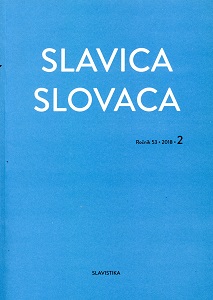Отчим наш“ и „хлеб насушный“ Церковнославянский язык в фольклорных текстах: глоссолалия или герменевтика?
The Church Slavonic Language in Russian Folkloric Texts: Glossolalia or Hermeneutics?
Author(s): Andrey Borisovich MorozSubject(s): Christian Theology and Religion, Language studies, Customs / Folklore, Sociolinguistics, Eastern Slavic Languages, Cultural Anthropology / Ethnology, Hermeneutics
Published by: SAV - Slovenská akadémia vied - Slovenský komitét slavistov a Slavistický ústav Jána Stanislava SAV, v.v.i.
Keywords: Church Slavonic; Folklore; Popular Etymology; Magic; Apokrypha; Folk Rituals;
Summary/Abstract: The article deals with the reflection of the Church Slavonic language and single church slavicisms in folkloric and parafolcoric (i. e. non-folkloric, but used in some folkloric rites) texts. Usually, slavicisms are deliberately or unwillingly distorted by performers who do not understand the liturgical language. Often, distortions completely desemantisize single lexemes or the entire church Slavonic text, that becomes glossolalia. This does not confuse the performers, since it is believed that the sacred text should not and can not be fully understood. At the same time, there is another trend: slavicisms are being distorted with means of paronymic attraction. Words is filled with a new meaning according to a situation of texts performing or to a wider historical or cultural context. Thus, we have a twofold relation to the Church Slavonic: refusal to understand in favor of attributing them a sacred status or changing its meaning with a new actual one.
Journal: Slavica Slovaca
- Issue Year: 53/2018
- Issue No: 02
- Page Range: 157-163
- Page Count: 7
- Language: Russian

